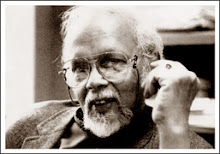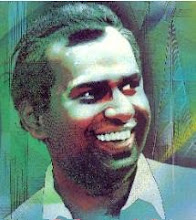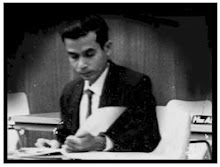| |
I met Simon very casually and by surprise. This was at the then University of Ceylon campus in Peradeniya. I was rushing for a lecture at the Arts Theatre.
Simon wearing a planter's type of hat was seated on the left of the circular stone stockade, which we as students used to sit along in the evenings some times until the commencement of a film or some entertainment event.
The time was about 2.45 p.m and Simon was seated alone. As soon as he saw me rushing towards the Arts Theatre, he glided down to his feet and walked towards me with a book and handed that to me and said
"Namel, you may not know me, I want you to read this and tell me what you think about it". It was his first piece of published writing, a collection of short stories - "Ohuge Kathawa" (His Story). I asked "why me".
He said "I have watched your interest in literary activities in the Campus and your achievement as a short story writer winning this year's Gold Medal. I also watched you playing in Dr Sarachchandra's Rattaran.
You were a typical "gamaya" (villager) in that. I think you will like to read this book and give me your opinion on it."
I was at the end of my second year. He was completing his first year. I did not know him until that day as a contemporary of mine, but my ego swelled and was really happy that he had waited for me to hand over his creation to an unknown soul like me though I was keen on literature and involved in such activity.
This was way back in 1959. I of course read it and met him after two days at his Hall of Residence and told him that I liked the stories and wanted him to write more and more. He had the touch of Maupassant and chiefly Chekhov's influence.
We met often and discussed on our interests and became friends and our colleagues thought that we were any way weird. I don't blame.
We both of us liked to be loners and remained so. Of course with the greatest respect I must say that I found him to be a very "unusual man" and was quite different from others in his characteristics and the way he thought about the world.
He had his own version of Marxism and his approach to the thoughts of the then trend of University thought and creativity.
He hardly concentrated on his studies but was interested in literary works madly. He was a vociferous reader and was always with a book all the time under his arm pit and in his habitual hat, not the type that he used to wear in his later life but the type I mentioned earlier.
After about three months of our meeting I heard to my amazement that Simon had disappeared from the Campus and is gone to hibernation. Nobody knew why, but the rumour spread that he left the Campus because a girl had fallen in love with him and he didn't want such affair to take place. That is how he gave up the University life in Peradeniya.
We later heard that he had gone back to his village Vanni in search of raw experience. He did not want to have a degree from the University or to be a scholar in it, but a degree and to become a scholar in the University of Life.
This was the most unusual attitude he adopted in life. It is this mind-set that made him an unusual creative intellect. It is this approach to life that will register him to be an immense literary figure in the history of arts in this country.
As a dramatist he was grand, creative, philosophical, and intellectual. His dramas were theatrical and meaningful. He was really a craftsman in his art and excelled in it.
"Suba saha Yasa" itself is sufficient to evidence this. No one will have the nerve to challenge that this play is not one of the best that had been ever written in Sinhala. It would be considered a classic in time to come and that is my personal opinion for its depth, humanity and dramaturgy it inherits.
I have no intention of listing all his plays since his first attempt as a playwright "Gangawak and Sapattuwak". In each of his plays he displayed maturity and his outlook in life whilst maintaining the integrity of craftsmanship that he inscribed into them for their theatricality as philosopher and intellect is immutable.
His talents did not confine only to theatrical works but equally well he shined as a creative and impressive actor since his debut in Dharamasiri Wickrmarathne's "Shan Eliya" in 1964.
He was at his best in his own production of "Suba saha Yasa", after Upali Attanayake. Both were great actors who gave different interpretations for the same character in the play.
His creative output in novels and short story writing was no less in importance and value that he inscribes to the experience that he drew from the University of Life.
"Suddhilage Kathawa" itself suffices to establish his creativity as a story teller. What I admire in his writings is his level of depth, maturity of his experiences and the craftsmanship he instills in them.
As a multifaceted creative dramatist, novelist, short story writer, essayist and thinker than the academic achievements he gained later in life surpasses the invaluable degree that he achieved in the University of Life.
He was no doubt a bohemian, but a human being too who earned a wealth of experiences that he left behind as a legacy for the future.





































No comments:
Post a Comment